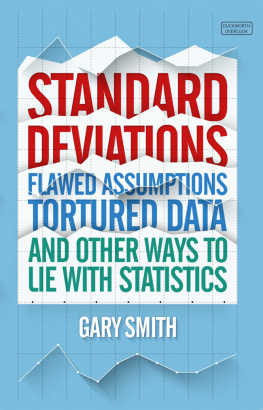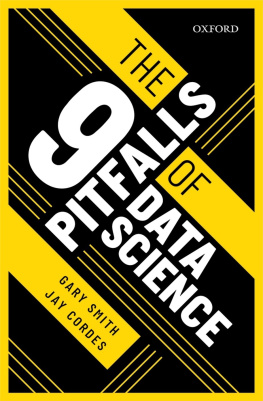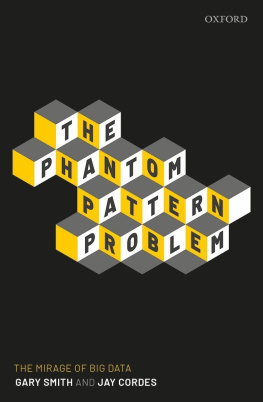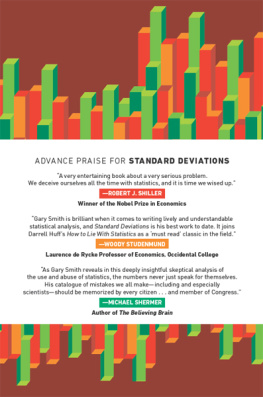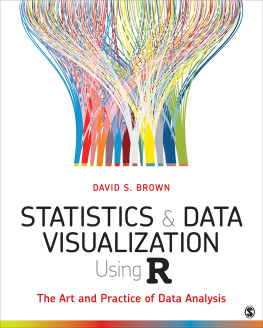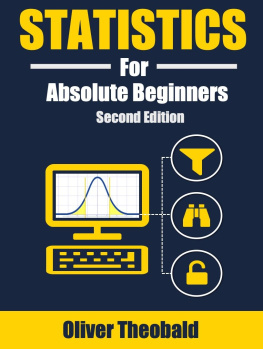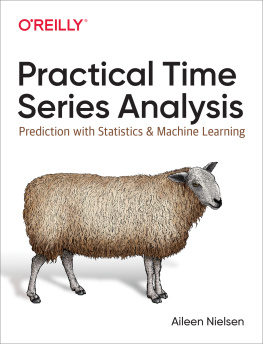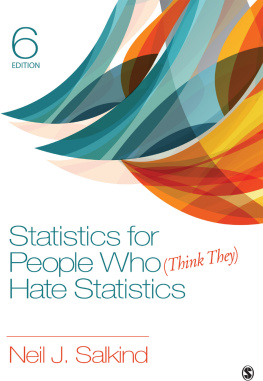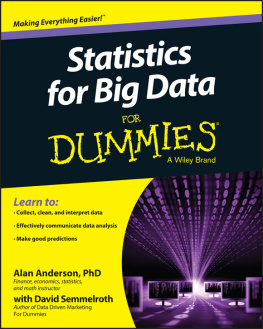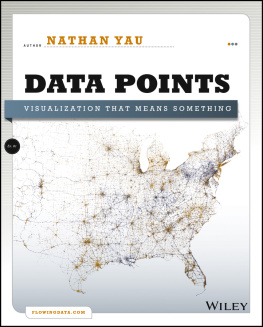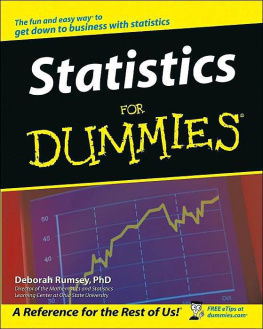MORE ADVANCE PRAISE FOR STANDARD DEVIATIONS
Gary Smiths Standard Deviations is both a statement of principles for doing statistical inference correctly and a practical guide for interpreting the (supposedly) data-based inferences other people have drawn. Cleverly written and engaging to read, the book is full of concrete examples that make clear not just what Smith is saying but why it matters. Readers will discover that lots of what they thought theyd learned is wrong, and theyll understand why.
BENJAMIN M. FRIEDMAN
William Joseph Maier Professor of Political Economy, Harvard University
Standard Deviations shows in compelling fashion why humans are so susceptible to the misuse of statistical evidence and why this matters. I know of no other book that explains important concepts such as selection bias in such an entertaining and memorable manner.
RICHARD J. MURNANE
Thompson Professor of Education and Society, Harvard Graduate School of Education
We all learn in school that there are three kinds of lies: lies, damn lies, and statistics. Gary Smiths new book imparts true substance to this point by setting forth myriad examples of how and why statistics and data-crunching at large are susceptible to corruption. The great risk today is that the young will forget that deductive logic is vastly more powerful than inductive logic.
HORACE WOODY BROCK
President, Strategic Economic Decisions, Inc.
Statistical reasoning is the most used and abused form of rhetoric in the field of finance. Standard Deviations is an approachable and effective means to arm oneself against the onslaught statistical hyperbole in our modern age. Professor Smith has done us all a tremendous service.
BRYAN WHITE
Managing Director, BlackRock, Inc.
Its entertaining, its gossipy, its insightfuland its destined to be a classic. Based on a lifetime of experience unraveling the methodical blunders that remain all too frequent, this book communicates Gary Smiths wisdom about how not to do a data analysis. Smiths engaging rendering of countless painful mistakes will help readers avoid the pitfalls far better than merely mastering theorems.
EDWARD E. LEAMER
Distinguished Professor and Chauncey J. Medberry Chair in Management, UCLA
Standard Deviations will teach you how not to be deceived by lies masquerading as statistics. Written in an entertaining style with contemporary examples, this book should appeal to everyone, whether interested in marriages or mortgages, the wealth of your family, or the health of the economy. This should be required reading for everyone living in this age of (too much?) information.
ARTHUR BENJAMIN
Professor of Mathematics, Harvey Mudd College and author of Secrets of Mental Math
STANDARD DEVIATIONS
STANDARD
DEVIATIONS

FLAWED ASSUMPTIONS,
TORTURED DATA, AND
OTHER WAYS TO LIE
WITH STATISTICS

GARY SMITH

DUCKWORTH OVERLOOK
This eBook edition 2014
First published in 2014 by
Duckworth Overlook
LONDON
30 Calvin Street, London E1 6NW
T: 020 7490 7300
E:
www.ducknet.co.uk
For bulk and special sales, please contact
or write to us at the address above
NEW YORK
141 Wooster Street, New York, NY 10012
www.overlookpress.com
2014 by Gary Smith
All rights reserved. No part of this publication may be reproduced, stored in a retrieval system, or transmitted, in any form or by any means, electronic, mechanical, photocopying, recording or otherwise, without the prior permission of the publisher.
The right of Gary Smith to be identified as the Author of the Work has been asserted by him in accordance with the Copyright, Designs and Patents Act 1988.
A catalogue record for this book is available from the British Library
ISBNs
Paperback: 978-0-7156-4914-5
Mobi: 978-0-7156-4973-2
ePub: 978-0-7156-4974-9
Library PDF: 978-0-7156-4975-6
To my wife Margaret and my children Josh, Jo, Chaska, Cory, Cameron, and Claire
CONTENTS
STANDARD DEVIATIONS
INTRODUCTION
w E LIVE IN THE AGE OF BIG DATA. THE POTENT COMBINATION of fast computers and worldwide connectivity is continually praisedeven worshipped. Over and over, we are told that government, business, finance, medicine, law, and our daily lives are being revolutionized by a newfound ability to sift through reams of data and discover the truth. We can make wise decisions because powerful computers have looked at the data and seen the light.
Maybe. Or maybe not. Sometimes these omnipresent data and magnificent computers lead to some pretty outlandish discoveries. Case in point, serious people have seriously claimed that:
| Messy rooms make people racist. |
| Unborn chicken embryos can influence computer random-event generators. |
| When the ratio of government debt to GDP goes above 90 percent, nations nearly always slip into recession. |
| As much as 50 percent of the drop in the crime rate in the United States over the past twenty years is because of legalized abortion. |
| Drinking two cups of coffee a day substantially increases the risk of pancreatic cancer. |
| The most successful companies tend to become less successful, while the least successful companies tend to become more successful, so that soon all will be mediocre. |
| Athletes who appear on the cover of Sports Illustrated orMadden NFL are jinxed in that they are likely to be less successful or injured. |
| Living near power lines causes cancer in children. |
| Humans have the power to postpone death until after important ceremonial occasions. |
| Asian Americans are more susceptible to heart attacks on the fourth day of the month. |
| People live three to five years longer if they have positive initials, like ACE. |
| Baseball players whose first names began with the letter D die, on average, two years younger than players whose first names began with the letters E through Z. |
| The terminally ill can be cured by positive mental energy sent from thousands of miles away. |
| When an NFC team wins the Super Bowl, the stock market almost always goes up. |
| You can beat the stock market by buying the Dow Jones stock with the highest dividend yield and the second lowest price per share. |
These claimsand hundreds more like themappear in newspapers and magazines every day even though they are surely false. In todays Information Age, our beliefs and actions are guided by torrents of meaningless data. It is not hard to see why we repeatedly draw false inferences and make bad decisions. Even if we are reasonably well informed, we are not always alert to the ways in which data are biased or irrelevant, or to the ways in which scientific research is flawed or misleading. We tend to assume that computers are infalliblethat no matter what kind of garbage we put in, computers will spit out gospel. It happens not just to laymen in their daily lives, but in serious research by diligent professionals. We see it in the popular press, on television, on the Internet, in political campaigns, in academic journals, in business meetings, in courtrooms, and, of course, in government hearings.

